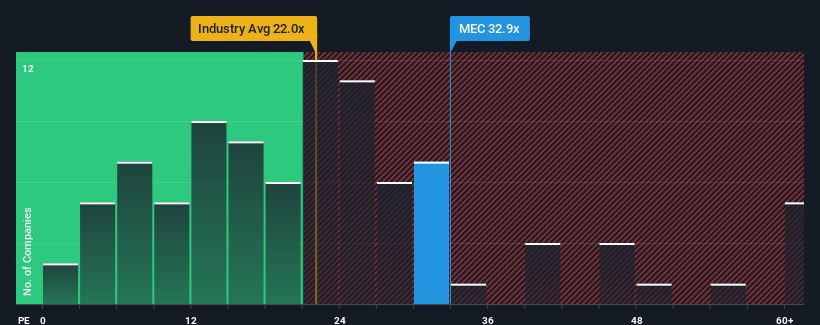- United States
- /
- Machinery
- /
- NYSE:MEC
With Mayville Engineering Company, Inc. (NYSE:MEC) It Looks Like You'll Get What You Pay For

Mayville Engineering Company, Inc.'s (NYSE:MEC) price-to-earnings (or "P/E") ratio of 32.9x might make it look like a strong sell right now compared to the market in the United States, where around half of the companies have P/E ratios below 16x and even P/E's below 9x are quite common. Although, it's not wise to just take the P/E at face value as there may be an explanation why it's so lofty.
Recent times have been pleasing for Mayville Engineering Company as its earnings have risen in spite of the market's earnings going into reverse. It seems that many are expecting the company to continue defying the broader market adversity, which has increased investors’ willingness to pay up for the stock. You'd really hope so, otherwise you're paying a pretty hefty price for no particular reason.
Check out our latest analysis for Mayville Engineering Company

What Are Growth Metrics Telling Us About The High P/E?
In order to justify its P/E ratio, Mayville Engineering Company would need to produce outstanding growth well in excess of the market.
Retrospectively, the last year delivered an exceptional 189% gain to the company's bottom line. Still, EPS has barely risen at all from three years ago in total, which is not ideal. Accordingly, shareholders probably wouldn't have been overly satisfied with the unstable medium-term growth rates.
Shifting to the future, estimates from the five analysts covering the company suggest earnings should grow by 49% each year over the next three years. With the market only predicted to deliver 12% per year, the company is positioned for a stronger earnings result.
With this information, we can see why Mayville Engineering Company is trading at such a high P/E compared to the market. It seems most investors are expecting this strong future growth and are willing to pay more for the stock.
The Final Word
Using the price-to-earnings ratio alone to determine if you should sell your stock isn't sensible, however it can be a practical guide to the company's future prospects.
We've established that Mayville Engineering Company maintains its high P/E on the strength of its forecast growth being higher than the wider market, as expected. At this stage investors feel the potential for a deterioration in earnings isn't great enough to justify a lower P/E ratio. It's hard to see the share price falling strongly in the near future under these circumstances.
There are also other vital risk factors to consider and we've discovered 2 warning signs for Mayville Engineering Company (1 is a bit concerning!) that you should be aware of before investing here.
It's important to make sure you look for a great company, not just the first idea you come across. So take a peek at this free list of interesting companies with strong recent earnings growth (and a low P/E).
New: Manage All Your Stock Portfolios in One Place
We've created the ultimate portfolio companion for stock investors, and it's free.
• Connect an unlimited number of Portfolios and see your total in one currency
• Be alerted to new Warning Signs or Risks via email or mobile
• Track the Fair Value of your stocks
Have feedback on this article? Concerned about the content? Get in touch with us directly. Alternatively, email editorial-team (at) simplywallst.com.
This article by Simply Wall St is general in nature. We provide commentary based on historical data and analyst forecasts only using an unbiased methodology and our articles are not intended to be financial advice. It does not constitute a recommendation to buy or sell any stock, and does not take account of your objectives, or your financial situation. We aim to bring you long-term focused analysis driven by fundamental data. Note that our analysis may not factor in the latest price-sensitive company announcements or qualitative material. Simply Wall St has no position in any stocks mentioned.
About NYSE:MEC
Mayville Engineering Company
Engages in the production, design, prototyping and tooling, fabrication, aluminum extrusion, coating, and assembling of aftermarket components in the United States.
Proven track record with adequate balance sheet.
Market Insights
Community Narratives



